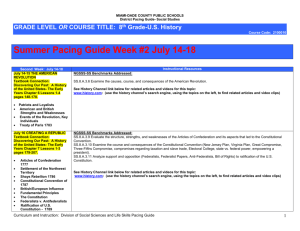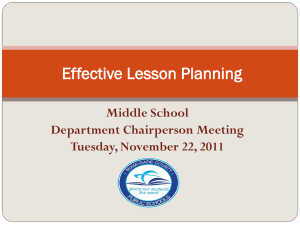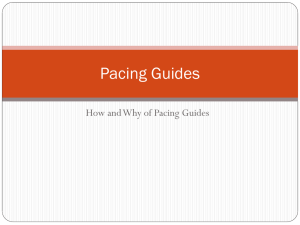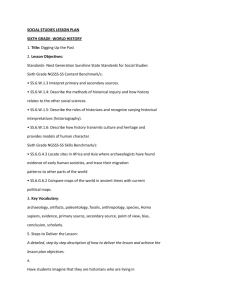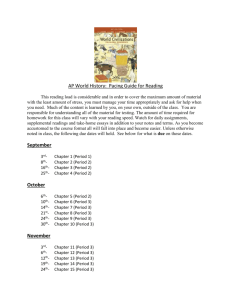Click on the title: “NGSSS-SS Course/Grade Level Descriptions
advertisement
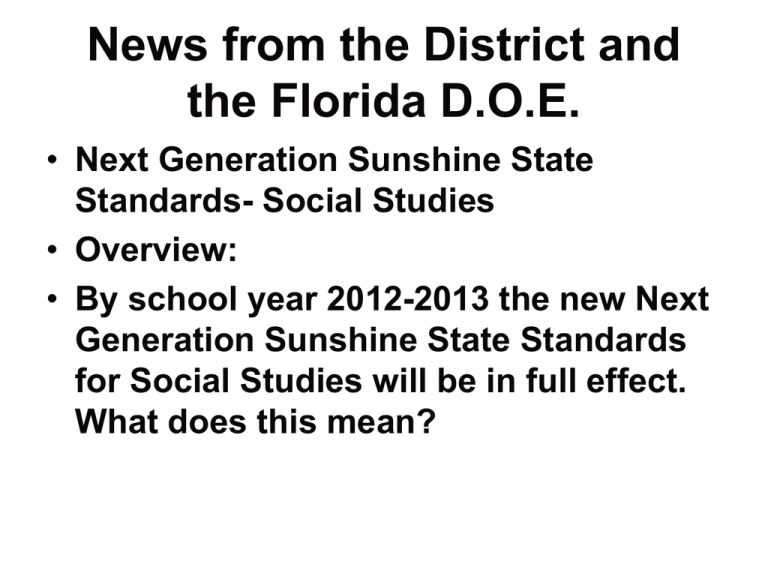
News from the District and the Florida D.O.E. • Next Generation Sunshine State Standards- Social Studies • Overview: • By school year 2012-2013 the new Next Generation Sunshine State Standards for Social Studies will be in full effect. What does this mean? NGSSS-SS • Grade Level Themes/Courses • Elementary: • K: Living, Learning, and Working Together • 1st Grade: Our Community and Beyond • 2nd Grade: Who We Are As Americans • 3rd Grade: The U.S. Regions and Its Neighbors • 4th Grade: Florida Studies • 5th Grade: U.S. History- up to 1850 NGSSS-SS • Grade Level Themes/Courses • Middle School • 6th Grade: World History- Early Civilizations to the Ancient and Classical Civilizations of Africa, Asia, and Europe. • 7th Grade: Civics • 8th Grade: U.S. History- Exploration to Reconstruction NGSSS-SS • Grade Level Themes/Courses • High School • American History (9-12): Reconstruction to the Present Day (typically taught in 11th grade) • World History (9-12): Middle Ages to the Present (typically taught in the 9th grade) • American Government (9-12): Study of the American System of Government (typically taught for ½ year in 12th grade) • Economics (9-12): Study of Macro and Micro Economics (typically taught for ½ year in 12th grade). NGSSS-SS • Comparison to CBC • See the next slide for a chart for a comparison between the format of the CBC and the NGSSS-SS, CBC NGSSS-SS Components in CBC Strands in NGSSS-SS Geographic Understanding Historical Awareness Civic Responsibility Economic Understanding Cultural Awareness Geography History (United States/American and/or World) Economics Civics and Government Humanities (high school only) No Specific Standard Standard- general learning objective th e.g. Standard 2- 8 grade: Examine the causes, course, and consequences of British settlement in the American colonies. Objectives in CBC (performance objective) Benchmarks in NGSSS-SS (performance objective) e.g. II.A.1. Analyze the political and economic reasons for the exploration of the New World and its consequences; e.g., impact on native cultures, increase in travel and trade, development of wealth and power. e.g., SS.8.A.2.1 Compare the relationships among the British, French, Spanish, and Dutch in their struggle for colonization of North America. No Access Points for Students with Significant Cognitive Disabilities NGSSS-SS Access Point for Students with Significant Cognitive Disabilities e.g. Independent SS.8.A.2.In.a Recognize the important differences among the European nations struggling for control over colonization of North American. e.g. Supported SS.8.A.2.Su.a Recognize an important difference of each of the European nations struggling for control over colonization of North America. e.g. Participatory SS.8.A.2.Pa.a Recognize that different groups fought for ownership of the same land. Competency No Competencies e.g., II.A.1. After studying important periods in United States and Florida history, and the individuals and groups who contributed to them, the students will create a live newscast, video program, or newspaper for a selected period of history by: a. Writing news stories about significant events and personalities of the selected time periods. b. (see CBC for the complete Competency). (Note: When pacing guides are developed, existing CBS competencies will be matched/aligned with the NGSSS-SS Benchmarks) Format of the NGSSS-SS • Strands – Geography – History (United States/American and/or World) – Economics – Civics and Government Humanities (high school only) • Standards (general learning objectives) • Benchmark (specific performance objectives) • Access Points for Students with Significant Cognitive Disabilities (Independent, Supported, Participatory) Sample NGSSS-SS How to Read • Elementary School • Middle School • Senior High School Sample Elementary Sample Middle School Sample Middle School Continued Sample Senior High School Sample Senior High School Continued… What do I write on my lesson plans? • Benchmarks • Example: • SS.912.A.2.1: Review causes and consequences of the Civil War. Where can I access the NGSSS-SS? • Go to the Division of Social Sciences Website • http://socialsciences.dadeschools.net/ • Look under “Curriculum Documents” • Click on the title: “Next Generation Sunshine State Standards for Social Studies K-12” and download the PDF. Grade Level Descriptions Course Descriptions • • • • Samples Elementary School Middle School Senior High School Elementary Example of Grade Level Description Middle School Example of Course Description Senior High School Course Description Example Senior High School Course Description Example Continued… Where can I access the course/grade level descriptions? • • • • Go to the Social Studies website http://socialsciences.dadeschools.net/ Look under “Curriculum Documents” Click on the title: “NGSSS-SS Course/Grade Level Descriptions: Links to Grade Level/Course Descriptions New Social Studies Textbook Adoptions Timeline Timeline: Textbook Adoption • Local District Textbook Selection Committee will be formed: Summer 2011 and selections made per grade level/course. • Textbooks ordered 2011-2012. • New materials in schools for fall 2012. • NOTE: Contingent upon funding from FL.DOE th 11 Grade U.S. History End of Course Exam • Timeline • Field Tested: May- 2012 • Base Line (the whole state tested): May2013 • Full Implementation: Spring- 2014 • Legislation- unclear as to the ramifications of the results of the American History end of course exam in terms of pupil progression, graduation, and school accountability. Civics- Update on Legislation HB 105 Governor signed into law on 5-13-10. General Implementation Timeline: • July 1, 2010 : The act becomes effective. • 2011-2012 school year : The reading portion of the language arts curriculum within the Sunshine State Standards to include civics education content. • 2012-2013 school year: For students entering grade 6 requires the successful completion of at least one-semester civics education course at middle grades. A statewide, standardized end-of-course assessment in civics education must be administered as a field test at the middle school level. • 2013-2014 school year: A student’s performance on the end-of-course assessment in civics education must constitute 30 percent of the student’s final course grade. • 2014-2015 school year: A student must earn a passing score on the endof-course assessment in civics education in order to pass the course and receive course credit. Social Studies Pacing Guides that Support Instruction with NGSSS-SS • New Social Studies Pacing Guides are now available for the following grade levels/courses and should be used to guide instruction as the official District Curriculum: • 4th Grade- Florida Studies • 5th Grade- U.S. History (Exploration through 1850) • 7th Grade- Civics • 8th Grade- U.S. History (Exploration through the Civil War) • 12th Grade- U.S. Government • 12th Grade- Economics • New Guides: can be downloaded from the Division of Social Sciences and Life Skills website, http://socialsciences.dadeschools.net/, under “Curricular DocumentNGSSS-SS Pacing Guides.” NGSSS-SS Pacing Guide Implementation Instructions: • • • • • • • • Please note the following important general information regarding the NGSSS-SS Pacing Guides: The Pacing Guides outline the required curriculum for social studies, grades K-12, in Miami-Dade County Public Schools. Social Studies Pacing Guides have been developed for all elementary grade levels (K-5) and for each of the required social studies courses at the middle and senior high school levels. The Social Studies Pacing Guides are to be utilized by all teachers, grades K-12, when planning for social studies instruction when full implementation and adoption of the NGSSS-SS goes into full implementation during the 2012-2013 academic year. During the 2010-2011, 2011-2012 academic years, the following grade levels should adhere to the new pacing guides: grade 4, 5, 7, 8, and 12 (Economics and Government). During the 2010-2011, 2011-2012 academic years, the following grade levels should attempt to infuse the NGSSS-SS where appropriate into their social studies instruction: Kindergarten, 1st grade, 2nd grade, 3rd grade, 6th grade, 9th grade, and 11th grade. Benchmarks associated with these grade levels/course can be downloaded from the Division of Social Sciences and Life Skills website under “Curricular Documents- NGSSS-SS Course Descriptions.” The Pacing Guides outline the required sequence in which the grade level or course objectives are to be taught. The Pacing Guides outline the pacing in which instruction should occur. Specifically, the Pacing Guides are divided into 9 week segments and provide an estimate of the number of traditional or block days needed to complete instruction on a given topic. Teachers should make every effort to stay on pace and to complete the topics in a given nine weeks. Slight variations in pacing may occur due to professional decisions made by the teacher or because of changes in school schedules. NGSSS-SS Pacing Guide Format • • • • • • • • • • Each Social Studies Pacing Guide is divided into the following headings/categories to assist teachers in developing lesson plans: Grade Level or Course Title - The grade level and course title are listed in the heading of each page. Course Code - The Florida Department of Education Course Code is listed for the course. Topic - The general topic for instruction is listed; e.g., Westward Expansion. Pacing - An estimated number of traditional or block instructional days needed to complete instruction on the topic is provided. Strands and Standards – Strands and Standards from the Next Generation Sunshine State Standards (NGSSS) are provided for each topic. Nine Week Grading Period - Grading periods (1-4) are identified. Essential Content – This critically important column provides a detailed list of content/topics and sub topics to be addressed during instruction. NGSSS-SS Benchmarks – This critically important column lists the required instructional Benchmarks that are related to the particular topic. The Benchmarks are divided into Content Benchmarks and Skill Benchmarks. These benchmarks should be identified in the teacher’s lesson plans. Instructional Tools - This column provides suggested resources and activities to assist the teacher in developing engaging lessons and pedagogically sound instructional practices. The Instructional Tools column is divided into the following subparts: Core Text Book, Key Vocabulary, Technology (Internet resources related to a particular topic), Suggested Activities, Assessment, English Language Learner (ELL) Instructional Strategies, Related Programs (National, State, and/or District programs as they relate to a particular topic), and SPED (A link to the NGSSS-SS Access Points for Students with Cognitive Disabilities). Course Descriptions and NGSSS-SS Benchmarks • The following social studies courses and grade level course descriptions can be downloaded from the Division of Social Sciences and Life Skills website, http://socialsciences.dadeschools.net/, under “Curriculum Documents- NGSSS-SS Course Descriptions.” • Grades K-3; • Grade 6- World History; • Grade 9- World History; and • Grade 11- U.S. History. • Teachers teaching these grade levels/courses should access the new benchmarks to begin infusing them into their social studies instruction where appropriate.
